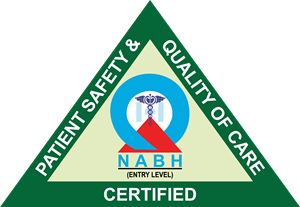The Cardiology Department in Jinkushal Cardiac Care specializes in the diagnosis, treatment, and prevention of heart and cardiovascular diseases. Our team of cardiologists, nurses, and technicians are highly trained and experienced in the field of cardiology. We are dedicated to providing exceptional care and working together to deliver the best possible outcomes for our patients.
Jinkushal Cardiac Care & Superspeciality hospital

Cardiology
Services: We offer a wide range of services, including-
Diagnostic Tests: We use state-of-the-art technology to perform a variety of diagnostic tests, including-
Electrocardiograms (ECGs)-
ECGs are non-invasive tests that measure heart electrical activity, diagnosing conditions such as arrhythmias and heart attacks. By recording the heart’s rhythm and impulses, they identify abnormalities and inform treatment decisions.

Echocardiograms-
Echocardiograms use ultrasound to image the heart, assessing its structure, valves, and blood flow. They diagnose valve issues, congenital defects, and heart failure, guiding treatment.
Stress Test –
Stress test assesses heart function during exercise to detect reduced blood flow and coronary artery disease. They monitor heart rate, blood pressure, and ECG changes, guiding treatment and safe physical activity recommendations.

Holter Monitor –
Holter monitor tracks heart activity for 24-48 hours, offering a thorough analysis of rhythm. They catch irregularities overlooked by standard ECGs, diagnosing arrhythmias and pinpointing causes of symptoms such as palpitations. This data guides effective treatment strategies for better cardiac health.
Dobutamine Stress Echocardiogram (DSE) –
For those people who can’t walk on treadmill e.g. old age, knee problems etc, Dobutamine injection is used to increase the heart rate. This test is done in hospital under continuous monitoring of heart rate with the monitor and ECG. 2D echo is done at basal heart rate, peak heart rate and rest to rule out heart muscle dysfunction. This test has very high sensitivity and specificity for diagnosing coronary artery disease.
Exercise Stress Echo –
All the diagnostic tests which are done at rest like ECG, 2D Echocardiography can’t pick up all the blockages in the coronary circulation. Hence for those people who can walk on treadmill, exercise stress ECHO is one of the prone test for ruling out blockages in the coronary arteries. Here baseline ECG and ECHO is done at rest then person walks on treadmill to 85% of pre specified heart rate as per age, ECH & ECHO is repeated at peak exercise and again repeated at rest. This rules out any decreased blood flow to the cardiac muscles and hence can diagnose blockages better. It has very high sensitivity and specificity to diagnose coronary artery disease.
Ambulatory Blood Pressure Monitoring (ABPM) –
In this test, a device is put on the person preferably on a working day and it takes the blood pressure every hour even during sleep. 24 to 40 readings are taken in 24 hours and then average blood pressures are calculated. As per all hypertension guidelines ABPM is the best tool to diagnose and monitor blood pressure. It gives accurate diagnosis and avoids the misdiagnosis due to white coat effect and masked hypertension.
Interventional Procedures: Our interventional cardiology team provides minimally invasive procedures to treat various heart conditions, including
Angioplasty –
Angioplasty is a minimally invasive procedure to widen narrowed or obstructed arteries. A balloon-tipped catheter is inserted into the blocked artery and inflated to compress fatty deposits and plaque against the artery walls, restoring blood flow.
Angiography –
Angiography is a medical imaging technique used to visualize the blood vessels in various parts of the body, typically done using a contrast agent and X-rays. It helps in diagnosing conditions like blockages or abnormalities in blood flow.

Peripheral Angioplasty –
Peripheral angioplasty is a type of angioplasty specifically used to treat blockages or narrowing in arteries outside the heart, typically in the legs or arms. It aims to improve blood circulation and alleviate symptoms like leg pain or cramping.
TAVI/TAVR-
Transcatheter Aortic Valve Implantation or Replacement is a novel technique where a diseased valve is treated with a new valve implanted with the help of a catheter based system. It is now approved for patients with aortic stenosis with low/ intermediate or high risk for open heart surgery and surgical aortic valve replacement (SAVR). The procedure is done in minimal anaesthesia, has precise results, low complication rates and good longevity. Patient has speedy recovery and in fact most patients can walk on day 2 or 3. Also diseased mitral or aortic valve placed by surgery (damaged previous prosthetic valves) earlier can also be treated with TAVI.

Electrophysiology: Our electrophysiology team specializes in the diagnosis and treatment of arrhythmias and other electrical disorders of the heart. We offer procedures such as

Pacemaker –
A pacemaker is a small device implanted in the chest to regulate heart rhythm. It emits electrical impulses to maintain a steady heartbeat, crucial for those with irregular heart rates or bradycardia.
Automatic Implantable Cardioverter-Defibrillator (AICD) –
AICD is a device implanted in the chest to monitor heart rhythm. It delivers an electric shock to restore normal rhythm in case of dangerous arrhythmias, such as ventricular fibrillation, preventing sudden cardiac death.
Cardiac Resynchronization Therapy (CRT) –
CRT is a treatment for heart failure. It involves implanting a device that coordinates contractions of the heart’s ventricles, improving heart function and symptoms like shortness of breath and fatigue in patients with dyssynchronous heartbeats.
Heart Failure Management: Our team works closely with patients to manage heart failure through medications, lifestyle changes, and advanced therapies such as-
ASD Device –
An Atrial Septal Defect (ASD) device is a minimally invasive medical implant used to repair a hole in the heart’s atrial septum. It’s deployed via catheterization, sealing the hole and restoring normal blood flow, reducing the risk of complications like stroke and heart failure.
VSD Device –
A Ventricular Septal Defect (VSD) device is a cardiac implant used to close a hole between the heart’s ventricles. Delivered through catheterization, it restores proper heart function, preventing complications like pulmonary hypertension and improving overall cardiac health.
- Coronary artery disease
- Heart attack
- Arrhythmias
- Heart failure
- Valve disease
- Aortic aneurysm and dissection
- Peripheral artery disease
- Hypertension


